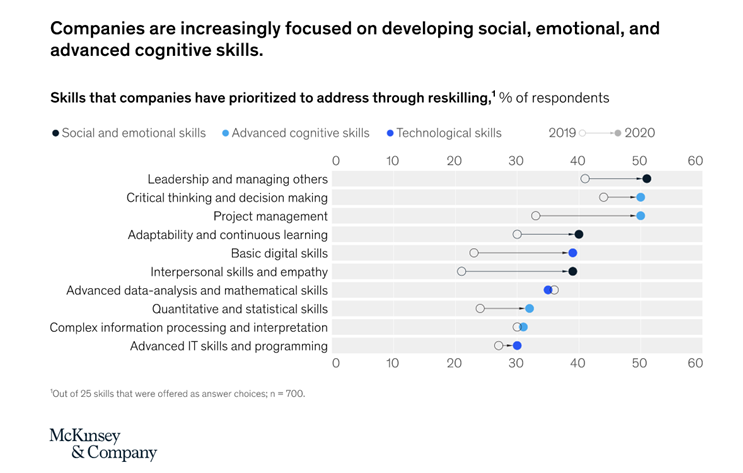New Normal, New Skills
Even before COVID-19, uncertainty was part of our daily lives. Climate change, migration and automation, just to mention a few of the factors changing our surrounding context, were already having a profound impact on industries and jobs. Add to that the shutdowns and remote work brought by the pandemic, and it quickly became clear that the world of work was changing beyond recognition.
And for many of us, work will never go back to ‘the way it was’ – indeed, we are determined that it should not. We have an opportunity now to evolve the way we work, and engage with others. And although many people endured significant financial and emotional hardship during the pandemic, the experience gave all of us the nudge that we needed to accelerate remote work and provide more balance for employees.
With this new normal, which includes hybrid workplaces and remote work, it is critical to recognise that although many hard skills may stay the same, our soft skills have had to change. According to the ‘The Future of Jobs’ report released by the World Economic Forum, COVID-19 accelerating automation is expected to result in the displacement of 85 million jobs by 2025, with analytical thinking, creativity and flexibility among the top skills needed.

In order for individuals to thrive in this new normal, it is necessary to:
- Work independently - demonstrate our ability to manage our own time and schedules rather than relying on regular supervision. This relies on trust, which we have to earn by showing our employers that we continue to deliver on our KPIs regardless of where we are performing the work.
- Demonstrate flexibility - this means having an open mindset to show our employers that we can work well under pressure, adjust to new and unexpected circumstances, and take on additional responsibilities.
- Communicate and collaborate - using technology and platforms like video meetings, WhatsApp and emails to communicate means that we have to be consistent and clear in order to ensure effective collaboration amongst team members. This includes simple things like replying to emails and messages on LinkedIn in a timely manner, finding platforms to engage your remote team members in a meaningful way, and training your leaders to conduct virtual interviews effectively.
- Embrace technology - we must all accept the fact that technology is now an integral part of all work. How willing we are to learn new technology, and quickly put it into practice, will now be a key factor for success. Although most of us do not need to know every system and platform, demonstrating a basic knowledge of big data, the Cloud, artificial intelligence (AI) and other emerging technology, can help catapult careers.
- Think critically - data published by the Society for Human Resource Management (SHRM) in the USA found that 37% of employers consider problem-solving and critical thinking among the top soft skills candidates lacked. Navigating fake news and misleading data is a daily struggle, so it is critical that we can think clearly and rationally to evaluate information objectively and make informed decisions.
- Take responsibility - working remotely without direct supervision means that we have to take responsibility for our own work and be proactive in finding prompt solutions to problems that may arise in our day-to-day. This is also a good pathway to leadership, which requires us to be innovative, self-aware and hold ourselves accountable.
According to a recent McKinsey study [1] companies are focused on filling skills gaps with social, emotional and advanced cognitive skills such as leadership, critical thinking and empathy; as well as emerging technical skills including data analysis, complex information processing and project management.
Employers need to work with their team leaders to identify skills gaps, and develop and implement training plans in line with strategic requirements, to ensure that our firms and people can continue to compete effectively in the global marketplace. This is particularly true for our young people, who have been the hardest hit by the pandemic. Investment in relevant modern training programs is essential, and governments should work quickly, with trade unions and private sector partners, to empower our youth with the skills they need to thrive after COVID-19.
It is important for all individuals, but particularly for those who are job hunting, to retool and train themselves to remain relevant and add value to the national workforce. Those who are on the job market need to be able to demonstrate these new skills on their resumes and during interviews, highlighting situations when they have put them to use, including during their academic pursuits. Candidates also need to seek out job opportunities where they can learn these skills and employers who value their creative and critical input, as well as provide them with the hybrid working environment they seek.
Lara Quentrall-Thomas - Chairman, Regency Recruitment and Resources Limited
